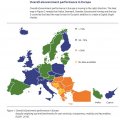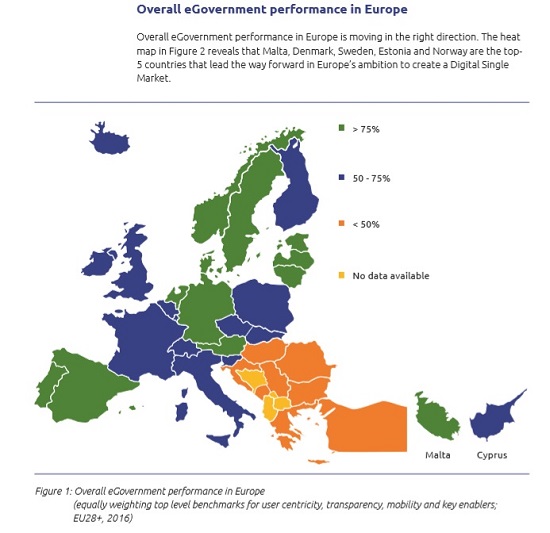 UK missing out as engagement seems low for some reason....
UK missing out as engagement seems low for some reason....
Europe continues to mature in electronic government as mobile-friendly public services are picking up and online public service delivery is progressing, says the 14th Benchmark Measurement of European eGovernment Services. The study carried out for the EC by Capgemini says a focus on greater transparency and investing in key digital enablers (such as electronic identification) is now crucial for strengthening eGovernment and fully establishing the Digital Single Market in the coming years.

It is clear that the smaller countries in the Nordics plus Malta, have invested and are on the way to getting the advantages that e-government offers, while others, including the UK, have fallen back in the race.
This year, the UK falls around the European average in terms of digitising its services, with an overall digitisation score of 59%; falling short of some of the bigger European economies including Spain (76%), Germany (76%), Italy (64%) and France (63%). The key challenge for the UK is to increase availability of key enablers such as electronic identification and authentication sources. The UK’s score for key enablers is 22% compared to the 52% EU average.
The 2017 eGovernment Benchmark puts a spotlight on the state-of-play of the digital transformation of European public administrations and the extent to which they are ‘on track’ with regard to achieving these objectives. This year’s eGovernment Benchmark, which surveyed over 10,000 websites across the EU28+ countries, evaluated the digital service quantity and quality in relation to four life events: starting a business, losing and finding a job, studying, and family life. The report shows that the European public sector continues to bring more services online. While countries quantitatively increased the online availability of public services, qualitative measures (e.g. more transparent delivery procedures and prepopulating online forms with personal data) are necessary to improve the overall digital service experience.
The digital transformation of governments across Europe is one of the cornerstones of achieving the Digital Single Market vision, as well as the broader EU2020 goals. The recent Ministerial Declaration emphasises the need to strive towards ‘open, efficient and inclusive, providing borderless, interoperable, personalised, user-friendly, end-to end digital public services to all citizens and businesses – at all levels of public administration1
User Centricity is the most advanced benchmark in Europe in 2016, emphasising the focus of governments to bring more public information and services online. Progress has been made as regards online availability of services in three life events that were measured consistently since 20122 Europe records a 12 percentage point (p.p.) increase (from 73% in 2012 to 85% in 2016), with countries such as Luxembourg and Latvia even progressing with 60% and 63% respectively. The gap between least performing country and best performing country is also closing (from a 52 p.p. gap to 47 p.p. in 2016). Mobile friendliness of public websites is rapidly increasing – though still only 1 in 2 public websites allow to properly read information and navigate public websites on a mobile device.
Transparency of government organisations, service processes and personal data averages at 59% for the EU28+ in 2016. Results for Transparency of service delivery processes (e.g. informing users on how long the process will take, response times, etc.) reveal that for half of all services the level of transparency is insufficient. As the eGovernment Benchmark has been stating since 2012, this is a key barrier for users to further continue their online journey and hence a must for governments to improve. The deployment of key technological enablers has most room for improvement (at 52%; EU28+). In particular, services in the Family life event are lagging behind.
For more information or to download the report, visit: here